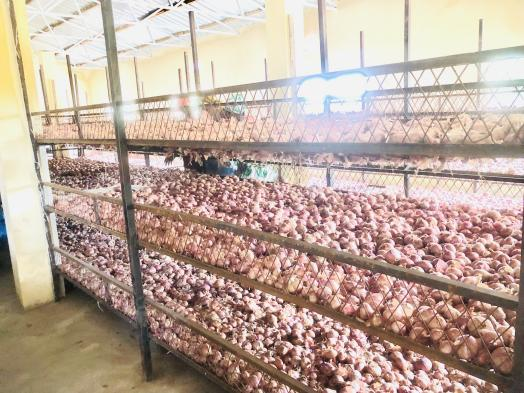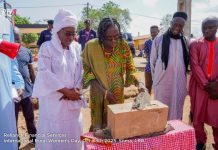By Mariama Marong
Women onion producers in Kiang Nema and PakauNjogu on Monday, 24 June 2024, embarked on a study tour of Berefet women’s garden and storage facility, where onions are preserved for seven months.
The aim of the visit of the women onion cultivators was to learn some of the best practices from Berefet community gardeners on the preservation and storage methods of their produce at their facility.
The Berefet onion storage facility was built by the West Africa Competitiveness Project (WACOMP) under the United Unions Industrial Development Organization (UNIDO), with support from the European Union. The WACOMP project constructed three storage facilities in Berefet, Nana ba, and Jahaur Mandinka, with an extra two that will be constructed in Kiang Nema and PakuNjogu. The storage center serves the triple role of curing, packing, and storing the onions.
Momodou Lamin Drammeh, the project coordinator for WACOMP, said UNIDO has established three storage facilities to adequately store onions to promote its cultivation, and noted that an extra two will be built at Nema and PakauNjogu. Mr. Drammeh commended the people of Berefet for sharing their knowledge for others to benefit from the storage facility and the skills of storing onions.
He informed the gathering that members of the two village garden committees were in Berefet to learn the skills of storing onions for long periods.
Karafading Badjie, president of Berefet women gardeners who also doubles as the leader of Berefet women, described their garden as a center of learning where people are trained on storage and preservation of onions, noting that it is important to create a unified bond among members to strengthen the advancement of their storage facility.
“As women gardeners, it is key to maintain peace and unity among ourselves because it is only through oneness that we can promote the development that we all yearn for,” Ms. Badjie said. She emphasized the involvement of women in commercial farming through the onion value chain, saying women are the leaders in this sector and should do away with subsistence cultivation and embark on a more profitable farming venture.
Ms. Badjie lamented that most vegetables and other food items are imported from Senegal and said this poses a serious threat to people’s health because ‘we do not know which type of chemicals had been used on these products’.
Majula Sanyang, the head of the Berefet women’s garden committee said before the availability of the storage facility, they were encountering series of challenges and they could not benefit more from their produces. She applauded WACOMP for saving their harvest from destruction.
“With the advancement of our storage facility, we can secure 80% of our onion produce unlike before, when nearly most of our goods perish, because of lack of a storage facility,” Ms. Sanyang said.
She said onion production has greatly enhanced and improved their source of income and has increased their living standards.
“We do not buy onions in Berefet anymore, because we have it in abundance and we are the main suppliers of most vendors,’’ she said.
Fatou Korta from Kiang Nema appreciated the study tour and acknowledged that they had learned a lot about how to utilize such a storage facility. She thanked WACOMP for initiating the visit and noted that they are ready to welcome a similar storage facility in their village because they want to emulate and do even more than the women of Berefet have been doing. She said the storage facility if completed, will enhance onion production in their area.
Sohna Ceesay, president of PakauNjogu women gardeners highlighted the importance of the study visit as key for women onion producers and a motivational preparation in welcoming their onion storage facility. She said women of her village are suffering great losses in their onion production and could not gain anything from their gardening due to the lack of a storage facility.
“We are happy that WACOMP will provide us with a storage facility and we are fully prepared to implement the knowledge gained here in Berefet,’’ Ms Ceesay said.

















